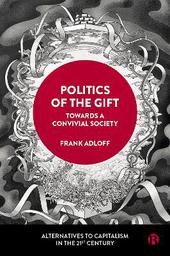
|
Politics of the Gift: Towards a Convivial Society
Hardback
Main Details
| Title |
Politics of the Gift: Towards a Convivial Society
|
| Authors and Contributors |
By (author) Frank Adloff
|
| Series | Alternatives to Capitalism in the 21st Century |
|---|
| Physical Properties |
| Format:Hardback | | Pages:186 | | Dimensions(mm): Height 234,Width 156 |
|
| Category/Genre | Economic systems and structures |
|---|
| ISBN/Barcode |
9781529226225
|
| Classifications | Dewey:302.14 |
|---|
| Audience | | Professional & Vocational | |
|---|
| Illustrations |
No
|
|
Publishing Details |
| Publisher |
Bristol University Press
|
| Imprint |
Bristol University Press
|
| Publication Date |
28 October 2022 |
| Publication Country |
United Kingdom
|
Description
At the heart of capitalism lies the idea of 'homo economicus': an ever-rational human being motivated by self-interest which arguably leads societies to economic prosperity. Drawing on French sociologist Marcel Mauss' influential theory of 'the gift', Frank Adloff shatters this fallacy to show mutual trust is the only glue that holds societies together; people are giving beings and they can cooperate for the benefit of all when the logic of all when the logic of maximizing personal gain in capitalism is broken. Acknowledging the role of women, nature and workers in the Global South in transforming society, this book proposes a politics of conviviality, (from Latin con-vivere: living together), for global and environmental justice as an alternative to the pursuit of profit, growth and consumption.
Author Biography
Frank Adloff is Professor of Sociology at the University of Hamburg and the co-director of the Humanities Centre for Advanced Studies, Futures of Sustainability.
Reviews"A convivial transformation of our society can no longer merely be hoped for; everything around us signals that this is a must. Frank Adloff's book is indispensable reading to (re)turn to the language and practices of giving, care, and solidarity." Francesca Forno, University of Trento "This book nicely weaves together a philosophical anthropology, a moral economy, an ethics of care, a politics of cooperation, a convivial technology, and an ecology into the politics of the gift. It will be an inspiring read for all those who believe that another world beyond growth and greed is possible." Frederic Vandenberghe, Federal University of Rio de Janeiro, Brazil
|